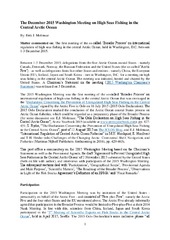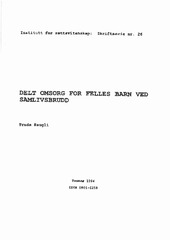Blar i tittel Artikler, rapporter og annet (jus)
Viser treff 41-60 av 260
-
Co-creazione della ricerca e del sapere nel sistema dell’ecologia integrale
(Journal article; Tidsskriftartikkel; Peer reviewed, 2022)“Nella mia prima conferenza ero partito dai poemi di Lucrezio e di Ovidio e dal modello di un sistema d’infinite relazioni di tutto con tutto […]” (I. Calvino, Lezioni Americane, 1988)<p> <p>Le riflessioni giuridiche, filosofiche e spirituali sull’etica ambientale convergono nel ritenere che la crisi ecologica del nostro tempo riflette la disfunzione del rapporto natura-società [1, 2, 3, 4, 5, ... -
Coastal states and MPAs in ABNJ: Ensuring consistency with the LOSC
(Journal article; Tidsskriftartikkel; Peer reviewed, 2018-08-22)To address the question how a future instrument for areas beyond national jurisdiction (ABNJ) might give consideration to the rights and obligations of coastal States and other States in establishing marine protected areas (MPAs) in ABNJ, the current article discusses the options that have been tabled in this respect in the preparatory meetings for the intergovernmental conference that will be ... -
A Cold Rain on the Parade When the Sámi Celebrate 100th Anniversary
(Journal article; Tidsskriftartikkel; Peer reviewed, 2017-02-06)6 February 2017 marks the centenary of The First Sámi Congress, which is also the reason that we today celebrate the 6th of February as the Sámi National Day. The First Congress will be thoroughly celebrated in Trondheim where it originally took place. Such an anniversary naturally inspires reflection on what the Sámi have achieved in the years since Elsa Laula Renberg and other visionary Sámi leaders ... -
The “Colonial Clause” and Extraterritorial Application of Human Rights: The European Convention on Human Rights Article 56 and its Relationship to Article 1
(Journal article; Tidsskriftartikkel; Peer reviewed, 2013-04-30)Article 56 of the European Convention on Human Rights is often referred to as the «colonial clause» and it has received little attention by commentators, whereas there has been extensive writing on Article 1of the Convention regarding the extraterritorial reach of that treaty. Article 56 has nevertheless the effect of limiting the responsibility of Member States for acts and omissions of the ... -
Comparing the Efficiency and Quality of Civil Justice in Scandinavia: The Role of Structural Differences and Definitions of Quality
(Journal article; Tidsskriftartikkel; Peer reviewed, 2019-11)Most studies on the efficiency and quality of civil justices are limited to formal courts, although tribunals and other quasi-courts have a central role in resolving legal disputes in many European countries. Hence, significant parts of many civil justice systems are excluded from the studies. Differences among countries may thus reflect primarily structural and terminological differences rather ... -
The Concept of Commons and Marine Genetic Resources in Areas beyond National Jurisdiction
(Journal article; Tidsskriftartikkel; Peer reviewed, 2018-11-27)This article explores some of the ways in which marine genetic resources conceptually and normatively intersect with the concept and idea of commons. Through an analysis of the terminological ambiguities and semantic slippages characterizing the usage of the concept of commons in international law, the article addresses questions relation to the idea of global commons and to the multiple reciprocal ... -
A Conceptual Framework for Complex Systems at the Crossroads of Food, Environment, Health, and Innovation
(Journal article; Tidsskriftartikkel; Peer reviewed, 2020-11-20)Climate-smart solutions and practices have the potential to contribute to the UN Sustainable Development Goals (SDGs) of achieving zero hunger; ensuring healthy lives and promoting the wellbeing of humans, animals, and plants; reducing ocean overharvesting and overfishing; tackling climate change; driving economic growth; and promoting innovation. Achieving these goals will require searching for, ... -
Conclusions and Outlook
(Chapter; Bokkapittel, 2016-12-19)The first and clear conclusion from the papers in this book is far from surprising: law of the European Union has impact on national civil procedure. This might concern primary EU law, secondary EU law, case law, fundamental legal principles or soft law instruments. At the same time, there seems to be significant variation on several aspects of the impact of EU law on national civil procedure law. ... -
Constitutional Rights for Children in Norway
(Chapter; Bokkapittel, 2019-12-02)In this chapter, I present and discuss the status of children’s rights in the Norwegian Constitution. The Constitution was amended in 2014 when a new bill of rights was added. The provisions are strongly influenced by international law and, when it comes to children, especially by the general principle of the Convention on the Rights of the Child (crc). I give an overview of the process leading up ... -
The Construction of Ocean Space in Areas Beyond National Jurisdiction. A Fisheries Perspective
(Chapter; Bokkapittel, 2022)This chapter examines the development of fisheries regulation in areas beyond national jurisdiction (ABNJ) from a constructivist approach. In doing so it provides important insights into how the construction of space is influenced by law making and institutional constraints, some of which reflect bias or imbalance in powers structures in international law. Many have defended law as a discreet and ... -
The Contribution of Integrated Marine Policies to Marine Environmental Protection: The Case of Norway
(Journal article; Tidsskriftartikkel; Peer reviewed, 2021-04-12)This article investigates the contribution of the Norwegian integrated marine management (IMM) plans to marine environmental protection and conservation. These plans have been described as international best practice, and the government’s goal is ‘for Norway to be a pioneer in developing an integrated ecosystem-based management regime for marine areas’. The plans pursue other objectives, including ... -
Corto Maltese and the Myriad Narratives of a More-than-Human Ocean: Revisiting Some of UNCLOS’ Ontological Assumptions
(Journal article; Tidsskriftartikkel; Peer reviewed, 2023-01-12)Graphic novels have been previously recognized by scholarly research as a valuable conceptual lens for thinking critically about law. Asserting the need for a deeper engagement with the material foundations, ontological beliefs and epistemological grids that lie under the development of international law of the sea, this article delves into the imaginary oceanic universe of Hugo Pratt’s classic ... -
Covid-19 and Norwegian Civil Justice
(Chapter; Bokkapittel, 2021)Norwegian courts have been digitised at an unprecedented pace during the Covid-19 pandemic. Because case management hearings were already conducted remotely and expert witnesses were often examined remotely, the transition to fully remote hearings has been fairly smooth in Norway, as will be explained in Section 2. However, the implementation of new technology has entailed some difficulties, in ... -
A critical interrogation of the relation between the ecosystem approach and ecosystem services
(Journal article; Tidsskriftartikkel, 2018-01-23)This article offers a critical interrogation of the relationship between two emerging conceptual frameworks whose importance has grown quickly within the context of international environmental law: the ecosystem approach and ecosystem services. Both premised on the concept of the ecosystem, their origin is parallel, but their present and future is convergent and increasingly intertwined. The ecosystem ... -
The December 2015 Washington Meeting on High Seas Fishing in the Central Arctic Ocean
(Chronicle; Kronikk, 2016-02-05) -
Defining the Blue Economy in an Arctic Fisheries and Aquaculture Context: Insights from International Experience
(Journal article; Tidsskriftartikkel; Peer reviewed, 2022-09-28)The paper is intended to show how the idea of the “blue economy” is conceptualized in the three main Arctic coastal regions: Northern Norway, the Russian Arctic Zone and Alaska (USA). This is done through the example of how fisheries and aquaculture function in these three regions and through an analysis of their official policies. The paper examines the current organization of blue economy management, ... -
Delt omsorg for felles barn ved samlivsbrudd
(Research report; Forskningsrapport, 1994) -
Den grenseoverskridende reindriften og beiterettighetene
(Journal article; Tidsskriftartikkel; Peer reviewed, 2020-10-22)Den samiske reindriften er basert på reinens naturlige vandringer mellom vinterens lavbeiter i innlandet og sommerens grøntbeiter ved kysten. Etter at landegrensen mellom Norge og Sverige ble fastlagt i 1751, har mange samer måttet krysse statsgrensen med sine dyr for å opprettholde sin næring. Etter unionsoppløsningen i 1905 har den grenseoverskridende reindriften vært gjenstand for forhandlinger, ... -
Den tidligere umatrikulerte grunnen i Finnmark: Jordfellesskap fremfor statlig eiendom?
(Journal article; Tidsskriftartikkel; Peer reviewed, 2020-06-12)Den tidligere umatrikulerte grunnen i Finnmark har lenge vært betraktet som statens eiendom, noe Samerettsutvalgets rettsgruppe stadfestet i 1993 og som senere er lagt til grunn av Høyeste-rett i Stjernøya- og Nesseby-dommen i hhv. 2016 og 2018. Denne eiendomsretten var tydeliggjort i en resolusjon fra 1775, som angivelig åpnet for utvisning av jord til oppsittere i Finnmark. I dette arbeidet ... -
Det nye grunnsystemets legitimitet (Det nye kvotesystemet mangler legitimitet på grunn av svak lovgivningsprosess)
(Journal article; Tidsskriftartikkel, 2021-11-10)Med knapt flertall (45 mot 42 stemmer) endret Stortinget den 9. februar 2021 grunnsystemet for deltakelse og tildeling av kvoter i ervervsmessig fiske.


 English
English norsk
norsk


















